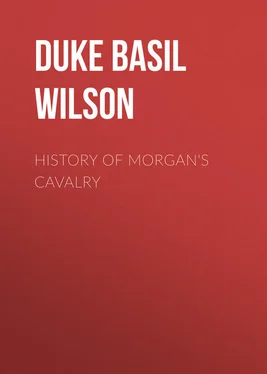Basil Duke - History of Morgan's Cavalry
Здесь есть возможность читать онлайн «Basil Duke - History of Morgan's Cavalry» — ознакомительный отрывок электронной книги совершенно бесплатно, а после прочтения отрывка купить полную версию. В некоторых случаях можно слушать аудио, скачать через торрент в формате fb2 и присутствует краткое содержание. Издательство: Иностранный паблик, Жанр: foreign_antique, foreign_prose, на английском языке. Описание произведения, (предисловие) а так же отзывы посетителей доступны на портале библиотеки ЛибКат.
- Название:History of Morgan's Cavalry
- Автор:
- Издательство:Иностранный паблик
- Жанр:
- Год:неизвестен
- ISBN:нет данных
- Рейтинг книги:3 / 5. Голосов: 1
-
Избранное:Добавить в избранное
- Отзывы:
-
Ваша оценка:
- 60
- 1
- 2
- 3
- 4
- 5
History of Morgan's Cavalry: краткое содержание, описание и аннотация
Предлагаем к чтению аннотацию, описание, краткое содержание или предисловие (зависит от того, что написал сам автор книги «History of Morgan's Cavalry»). Если вы не нашли необходимую информацию о книге — напишите в комментариях, мы постараемся отыскать её.
History of Morgan's Cavalry — читать онлайн ознакомительный отрывок
Ниже представлен текст книги, разбитый по страницам. Система сохранения места последней прочитанной страницы, позволяет с удобством читать онлайн бесплатно книгу «History of Morgan's Cavalry», без необходимости каждый раз заново искать на чём Вы остановились. Поставьте закладку, и сможете в любой момент перейти на страницу, на которой закончили чтение.
Интервал:
Закладка:
Mr. Clay sincerely believed that in the union of the States resided the surest guarantees of the safety, honor, and prosperity of each, and he contemplated with horror and aversion any thought of disunion. His own lofty and heroic nature could harbor no feeling which was not manly and brave, but, in striving to stimulate and fortify in his people the same love of union which he entertained himself, he taught many Kentuckians to so dread the evils of war, as to lose all fear of other and as great evils, and to be willing to purchase exemption from civil strife by facile and voluntary submission. After the death of Mr. Clay, Kentucky, no longer subjected to his personal influence, began to forget it.
In 1851, John C. Breckinridge had been elected to Congress from Mr. Clay's district, while the latter still lived, and beating one of his warmest friends and supporters. Under the leadership of Mr. Breckinridge, the Democratic party in Kentucky rallied and rapidly gained ground. During the "Know-nothing" excitement, the old Whigs, who had nearly all joined the Know-nothing or American party, seemed about to regain their ascendency, but that excitement ebbing as suddenly as it had arisen, left the Democracy in indisputable power. In 1856, Kentucky cast her Presidential vote for Buchanan and Breckinridge by nearly seven thousand majority. Mr. Breckinridge's influence had, by this time, become predominant in the State, and was felt in every election. The troubles in Kansas and the agitation in Congress had rendered the Democratic element in Kentucky more determined, and inclined them more strongly to take a Southern view of all the debated questions. The John Brown affair exasperated her people in common with that of every other slaveholding community, and led to the organization of the State-guard.
Created because of the strong belief that similar attempts would be repeated, and upon a larger scale, and that, quite likely, Kentucky would be selected as a field of operations, it is not surprising that the State-guard should have expected an enemy only from the North, whence, alone, would come the aggressions it was organized to resist, and that it should have conceived a feeling of antagonism for the Northern, and an instinctive sympathy for the Southern, people.
These sentiments were intensified by the language of the Northern press and pulpit, and the commendation and encouragement of such enterprises as the Harper's Ferry raid, which were to be heard throughout the North.
In the Presidential election of 1860, the Kentucky Democracy divided on Douglas and Breckinridge, thereby losing the State. After the election of Mr. Lincoln and the passage of ordinances of secession by several Southern States, when the most important question which the people of Kentucky had ever been required to determine, was presented for their consideration, their sentiments and wishes were so various and conflicting, as to render its decision by themselves impossible, and it was finally settled for them by the Federal Government.
The Breckinridge wing of the Democracy was decidedly Southern in feelings and opinions, and anxious to espouse the Southern cause.
The Douglas wing strongly sympathized with the South, but opposed secession and disunion.
The Bell-Everett party, composed chiefly of old Clay Whigs, was decidedly in favor of Union. Such was the attitude of parties, with occasional individual exceptions. The very young men of the State were generally intense Southern sympathizers, and were, with few exceptions, connected with the State-guard. Indeed, divided as were the people of Kentucky at that time, sympathy with the Southern people was prevalent among all classes of them, and the conviction seemed to be strong, even in the most determined opponents of secession, that an attack upon the Southern people was an attack upon themselves. Among the Union men it was common to hear such declarations as that "When it becomes a direct conflict between North and South, we will take part with the South," "The Northern troops shall not march over our soil to invade the South," "When it becomes apparent that the war is an abolition crusade, and waged for the destruction of slavery, Kentucky will arm against the Government," etc.; each man had some saving clause with his Unionism. It is no hazardous assertion that the Union party, in Kentucky, condemned the secession of the Southern States, more because it was undertaken without consultation with them, and because they regarded it as a blow at Kentucky's dignity and comfort, than because it endangered "the national life." Certainly not one of the leading politicians of that party would have dared, in the winter and spring of 1861, to have openly advocated coercion, no matter what were his secret views of its propriety.
Upon the 17th February, 1861, the Legislature met in extra session at the summons of Governor Magoffin. Seven Southern States had seceded, the Confederate Government had been inaugurated, and it was time for the people of Kentucky to understand what they were going to do. The Governor addressed a message to the Legislature advising the call of a State Convention. This the Legislature declined to do, but suggested the propriety of the assembling of a National Convention to revise and correct the Federal Constitution, and recommended the "Peace Conference," which was subsequently held at Washington. In certain resolutions passed by this Legislature, in reference to resolutions passed by the States of Maine, New York and Massachusetts, this language occurs: "The Governor of the State of Kentucky is hereby requested to inform the executives of said States, that it is the opinion of this General Assembly that whenever the authorities of these States shall send armed forces to the South for the purpose indicated in said resolutions, the people of Kentucky, uniting with their brethren of the South, will as one man, resist such invasion of the soil of the South, at all hazards and to the last extremity." Rather strong language for "Union" men and a "loyal" legislature to use. It would seem that Kentucky, at that time, supposed herself a "sovereign" State addressing other "sovereign" States, and that she entirely ignored the "Nation." Her Legislature paid as little attention to the "proper channel of communication" as a militia Captain would have done. The Union men who voted for the resolutions in which this language was embodied, would be justly liable to censure, if it were not positively certain that they were insincere ; and that they were insincere is abundantly proven by their subsequent action, and the fact that many of them held commissions in the "armed forces" sent to invade the South. On the 11th of February the Legislature resolved, "That we protest against the use of force or coercion by the General Government against the seceded States, as unwise and inexpedient, and tending to the destruction of our common country."
At the Union State Convention, held at Louisville on the 8th of January, certain amendments to the Constitution of the United States were "recommended," and it was resolved, "that, if the disorganization of the present Union is not arrested, that the States agreeing to these amendments of the Federal Constitution shall form a separate Confederacy , with power to admit new States under our glorious Constitution thus amended ;" it was resolved also that it was "expedient to call a convention of the border free and slave States," and that "we deplore the existence of a Union to be held together by the sword."
It almost takes a man's breath away to write such things about the most loyal men of the loyal State of Kentucky. For a Union Convention to have passed them, and Union men to have indorsed them, the resolutions whose substance has been just given, have rather a strange sound. They ring mightily like secession.
Читать дальшеИнтервал:
Закладка:
Похожие книги на «History of Morgan's Cavalry»
Представляем Вашему вниманию похожие книги на «History of Morgan's Cavalry» списком для выбора. Мы отобрали схожую по названию и смыслу литературу в надежде предоставить читателям больше вариантов отыскать новые, интересные, ещё непрочитанные произведения.
Обсуждение, отзывы о книге «History of Morgan's Cavalry» и просто собственные мнения читателей. Оставьте ваши комментарии, напишите, что Вы думаете о произведении, его смысле или главных героях. Укажите что конкретно понравилось, а что нет, и почему Вы так считаете.












